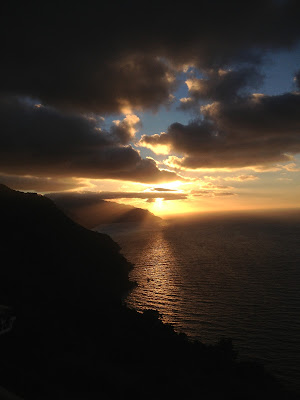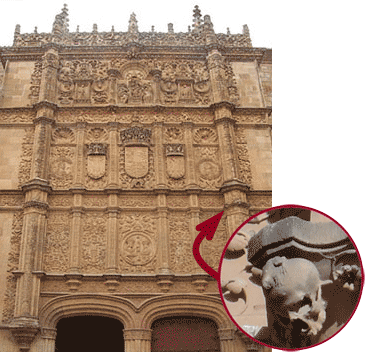As a quick
disclaimer: I don’t pretend to speak with any authority on Lisbon’s worthiness as a tourist destination.
My comments are based entirely on personal experience and my own perceptions of
what I saw and did. I mean no offense to Portugal or anyone who loves the
country, so let’s not get all "she doesn't know what she's talking about" on me.
 |
| I'll talk more about this market in a bit. |
The best way I can explain Lisbon
is “weird.” Since I got back from Lisbon, multiple Spaniards have told me that
most people either love it or hate it, and that it´s necessary to go back a
second time to confirm whether my gut was wrong the first time around. We´ll
see if I ever make it back. But there are some beautiful spots, shown below.
 |
| View from our hostel. |
In early November, we had a
“puente,” a government-sanctioned long weekend, and we wanted to get out of Spain
for the sake of going to another country, really. My two female roommates and I
had planned to rent a car and drive to Porto, Portugal, a northern port city known for
its close ties with the Duero River and its wines, and then to Lisbon. Porto
would´ve been a roughly six-hour drive, and it's about 3 1/2 hours or so from
there to Lisbon.
From Lisbon to
Don Benito is about four hours.
 |
| Porto looks like it would've been pretty awesome, no? Source |
As I
mentioned in my
Marbella post, I can´t drive a
manual car, and neither can my Wisconsin
roommate. When we saw how expensive it would be for our 23-year-old British
roommate to drive (200 euros or more), our rental plans fell through. We were
being snobbish and didn´t want to take the bus, thus making everything more difficult for ourselves. As it turned out, two of my roommate's friends (an
auxiliar from France and another one from Oregon) had plans to travel to Lisbon
and three open seats in the car, so Rachel (the Wisconsinite) and I hitched a
ride with them.
I wish
there would´ve been a Spanish fly on the wall to listen to our strange butchering
of languages in the car. The French guy, Alex, speaks French, Portuguese,
Spanish and English, in that order. Although Alex´s English is quite good, he´s
more comfortable with Spanish. So, our plan was to speak Spanish most of the
time so that we were all on a level playing field (by the end of the trip, that
plan proved to be a bit idealistic because it's easier to default into English,
but…). I'm sure our conversations would've been hilarious for a Spaniard to
listen to. A lot of what we Americans said was translated literally from
English, and I'm sure the same was true for Alex in French. Most of it probably
really didn't make sense, but we understood. The music in the car was an eclectic
mix of Spanish, English and French rap, rock and pop.
Lisbon is a tangle of steep, twisting streets. It's a miracle we made it anywhere by car, really. One street was a
one-way. The next was pedestrian-only. Another was so narrow that I sucked in
as we squeezed through, as if my girth had any effect on the size of the
vehicle (it's like when a bird flies at your windshield and it's instinctual to
duck.) Finding parking was a whole other challenge. We drove around for at
least a half hour or more, scouring the streets for a spot large enough to
accommodate Alex's tiny European car. No luck. Eventually we surrendered and
paid 20 euros (about $26) to park. The following day, thankfully, Alex found a
street spot and moved the car.
 |
| Hence the parking issues... Source |
We got into
Lisbon on Friday
evening, did a bit of wandering and sought a restaurant with proper Portuguese
fare. Portuguese food is seafood, for the most part, and the country is famous
for its cod. In the true spirit of the trip, we each ordered the day's special,
which was cod with fries, at a local restaurant. When we sat down, the waiter brought us a plate of
cooked-but-intact fish – heads and all. We had no idea how to eat them, so we
just picked out the meat. We assumed the fish was complimentary because he
brought it without us asking. It ended up being something like 4 euros. You
live and you learn, I suppose. Never assume appetizers or bread are
complimentary in Europe. Never.
 |
| The main dish |
Later that
night we headed out to the bars in the infamous-but-kind-of-seedy Bairro Alto,
a neighborhood packed with hundreds of mostly tiny bars and music venues. We
popped in and out of several, searching for cheap drinks and people who weren't
speaking English. We didn't have much luck on either front. You see, the
problem with Lisbon, to me,
is that it's popular with northern Europeans and Brazilians, most of
whom speak impeccable English. I guess if you´re looking for a place to travel where
you don't need to speak the native tongue, Portugal´s the place to go.
Portuguese people speak phenomenal English, and even if they didn't, you
wouldn't have to look far for a native speaker or a Brazilian.
The
following day, my roommate, our French friend and I set out to discover Lisbon while our Oregon
buddy slept off a mild hangover. Someone had recommended that we visit the
Feira da Ladra flea market in the Alfama district. To get there, we packed into
one of the famous yellow rumbling Number 28 trams, which are reminiscent of the
San Francisco street
trollies. (I´ve never been to San Francisco, but Lisbon, with its proximity to
the water, tourist-packed street cars, Golden Gate-like bridge and impossibly inclined streets, conjures images of SF.)
The trollies, which have been in use for
almost a century, glide through the cramped streets in the same lanes as cars,
making for a nerve-wracking ride as drivers weave around them. Before our ride,
we were really excited to take a cruise in one of the ubiquitous trams. Then we
got on and weren´t so excited anymore. See why below.
 |
| Too. Many. People. |
I still
can't figure out why anyone recommends the flea market – apparently a lot of
people do because a stream of fellow tourists disembarked the tram at the
market stop. At the market, I encountered some of the weirdest people and
weirdest merchandise I've seen in a while. I kept a firm hand on my belongings
and an eye on the shady characters around me. Part of me was thoroughly
disgusted and bewildered by some of the things people were selling: unwashed
socks, old tennis shoes, stuffed cloth penises, 90s porn videos and presumably
non-functional stereo equipment. The other part of me was really sad for the
people whose livelihoods depend on someone purchasing that junk. I´m sorry if I
sound insensitive, but it's not a part of Lisbon
worth showcasing, so I was dumbfounded that it has managed to charm its way
into guidebooks. Perhaps it´s appealing if you're drawn to a city's quirky,
less romantic side?
 |
| Some of the flea fare. |
I thought Lisbon couldn't get worse
after that market – and then it did, or at least it didn't get better. As we
wandered the streets trying to find the manicured Belém neighborhood, we
encountered Lisbon´s rather scruffy side: dilapidated buildings, more shady
characters, stuff that looked like it'd be in a Tim Burton movie. Exhibit A
below.
One guy we passed on the sidewalk looked at me so intently that I was
sure he was going to sprint off with my purse.
 |
| We did, however, encounter these adorable chess matches. Apparently this happens in real life. |
We
eventually made it to the Plaza do Comercio along the Tagus
River, which was pretty and alive, so
it's not to say Lisbon
doesn´t have any redeeming qualities. On our way to the Plaza, we passed by a
gourmet hamburger restaurant that was about to close for siesta, so we mentally
stored the name and decided we´d go back for dinner. We snapped some photos in
the plaza, did a quick, free wine tasting (none of the wines were worth noting)
and continued our mission to find Belém.
 |
| In the plaza. |
We walked forever. And forever. And
then some more. We eventually made the French friend ask some Portuguese people
how far we were. Apparently we were laughably far. “Look at those idiot tourists,”
is what I´m sure they said after we turned around, defeated. We raised the
white flag, hopped on a train toward the center of town and went back to our
hostel to meet up with Mr. Hungover.
By the time
we made it to the hamburger joint for dinner, we were starving for a taste of America. As it
turned out, the place belonged to Brazilian immigrants who had an
interesting, bun-less take on burgers. Even so, they were great – it was the
best meat I´ve tasted since I´ve been in Europe,
and the workers were friendly, so no complaints here.
 |
| But really, a bunless hamburger isn't a burger at all, right? |
On Sunday
we wisely took the car to visit the tourist hotspots in Belém on our way out of
town. We checked out the “Monument to the Discoveries,” an homage to the many
Portuguese world discoverers (Magellan, Vasco de Gama and Columbus are a few,
although Columbus’
nationality is in question). We essentially paid a couple of euros to climb to
the top of the stone structure for great panoramic views of Lisbon. But I’m not complaining. Apparently
there’s an auditorium inside with a projector showing features on the history
of Lisbon, but
we didn’t notice anything of the sort. There was an exhibition downstairs about
diplomacy (or lack thereof) between India
and Portugal,
but…
Ostensibly a
52-metre-high (171 ft) slab standing vertically along the bank of the Tagus, the [monument’s] design takes the form of the prow of a caravel (ship used in the early Portuguese
exploration). On either side of the slab are ramps that join at the river's
edge, with the figure of Henry
the Navigator on its
edge. On either side of the Infante, along the ramp, are 16 figures (33 in total)
representing figures from the Portuguese Age of Discovery. These great people of the era included monarchs, explorers, cartographers, artists, scientists and missionaries. Each idealized figure is designed to show
movement towards the front (the unknown sea), projecting a direct or indirect
synthesis of their participation in the events after Henry.
We were in
a hurry to get home after we left the monument because Oregon
had lessons to plan back in Spain.
We rushed to the Tower
of Belém, did a classic
tourist group photo outside and left without really knowing what we had seen.
[The tower] is a UNESCO
World Heritage Site (along with the nearby Jerónimos Monastery)[2]
because of the significant role it played in the Portuguese maritime
discoveries of the era of the Age of Discoveries.[3]
The tower was commissioned by King John II to be part of a defense
system at the mouth of the Tagus River and a ceremonial gateway to Lisbon.[3]
The tower was built in the early 16th century and is a prominent example of
the Portuguese Manueline style,[4]
but it also incorporates hints of other architectural styles.[5]
The structure was built from lioz limestone and
is composed of a bastion
and the 30 meter (100 foot),[1]
four story tower. It has incorrectly been stated that the tower was built in
the middle of the Tagus and now sits near the shore because the river was
redirected after the 1755 Lisbon earthquake. In fact, the tower
was built on a small island in the Tagus
River near the Lisbon shore.[5][6]
Source
This last part
isn’t necessarily worth reading, but because this blog also serves as a sort of
personal diary for me to look back on 37 years from now, I must mention the
following incident. On our drive home, the four of us were starving. My
roommate’s and I’s eyes were peeled for McDonald’s, but we accidentally sped
past two before we had time to swerve into the exit lane. As a last resort, we
stopped at a Portuguese convenience store/café. I bought a pork sandwich, and Oregon bought a pack of
processed, chocolate-filled croissants. It was the worst food experience thus
far. The pork was so tough I couldn’t even chew it. The croissants, well, they
were just plain bad. An unfortunate farewell to Portugal…
 |
| So disappointing. I'm actually crying in this photo...from laughing, but crying nonetheless. |
In sum, I’m
still not sure how I feel about Portugal
at the moment, even after reliving the experience while writing this blog. I’m
sure I’ll go back, but right now, I’m not dying to do so.
Un saludo,
Teresa


























































